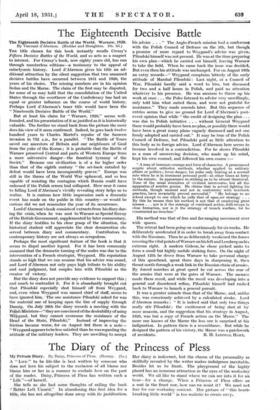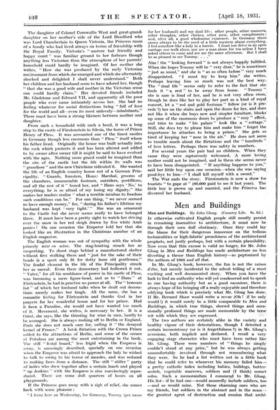The Diary of the
Princess of Pless
My Private Diary. By Daisy, Princess of Pleas. (Murray. 21s.) A " LIFE " to be life-like is best written by someone who does not love his subject to the exclusion of all blame nor blame him or her in a manner to exclude love- on the part of the reader. Daisy, Princess of Pleas has written such a "Life "—of herself.
She tells us she had some thoughts of calling the• book " Better Left Unsaid." In abandoning this first idea for a title, she has not altogether done away with its justification.
Her diary is indiscreet, but the charm of the personality so skillfully revealed by the writer makes indulgence inevitable. Besides let us be frank. The playground of the highly placed has an immense attraction in the eyes of the workaday world. We all like to stand where we can see into it for an hour—for a change. When a Princess of Pleas offers us a- seat in the front row, how can we resist it? We need not fear for our workaday content. Her picture of " this heart. breaking little world " is too realistic to create envy.
The daughter of Colonel Cornwallis West and great-grand- daughter on her mother's side of the Lord Headford who was Lord Chamberlain to Queen Victoria, the Princess came Of a family who had lived always on terms of friendship with the Royal Family. Victoria's " austere but friendly and happy court " was familiar ground to her forbears though anything less Victorian than the atmosphere of her parents' household could hardly be imagined. Of her mother she *rites, " How she was produced by the early Victorian environment from which she emerged and which she alternately shocked and delighted I shall never understand." Both her children and her husband seem to have adored her, though " that she was a good wife and mother in the Victorian sense one could hardly claim." Her devoted friends included Mr. Gladstone and Edward VII, and apparently all the poor people who ever came intimately, across her. She had no feeling whatever for social distinctions being " full of love for the world and all—even its most unlovely—inhabitants." There must have been a strong likeneis between mother and daughter.
From such a household with such a head, it was a long step to the castle of Ffirstenstein in Silesia, the home of Prince Henry of Pless. It was accounted one of the finest castles in Germany though less enormous than " Pless " itself where his father lived. Originally the house was built actually into the rock which protects it and has been altered and added to by owner after owner till it might be said to have evolved with the ages. Nothing more grand could be imagined than the site of the castle but the life within its walls was " grandiose " and the new Chatelaine ridiculed it. She wanted the life of an English country house not of a German Prin- cipality. " Guards, foresters, House Marshal, grooms of the chambers, innumerable footmen, outriders, postillions, and all the rest of it " bored her, and " Hans says No,' to everything, he is so afraid of my losing my dignity." She makes her readers realise what a terrible incubus to freedom such conditions can be." For one thing, " we never seemed to have enough money," for, ",during his father's lifetime my husband was kept ' very tight.' " She was an ornament to the Castle but she never seems really to have belonged there. It must have been a pretty sight to watch her driving over the snow in her red sleigh drawn by five white Arab ponies ! On one occasion the Emperor told her that she looked like an illustration in the Christmas number of an English magazine.
The English woman was out of sympathy with the whole princely misc en scene. The stag-hunting struck her as unsporting. To shoot stags behind a manufactured shelter without first stalking them and " just for the sake of their beads is a sport only fit for dotty lame old gentlemen." The feudal clement in the life of the Principality struck her as unreal. Even there democracy had hollowed it out. " Vater," for all his semblance of power in his castle of Pless, was becoming a mere figure-head, and as to " Hans " at Ffirtenstein, lie had in practice no power at all. The " honours list " of which her husband talks when he dealt out decora- tions merely makes her laugh. All the same, she has a romantic feeling for Fiirtenstein and thanks God in her prayers for her wonderful house and for her prince. Had it been a Paradise, she would not have wanted too much of it. Movement, she writes, is necessary to her. It is a thirst, she says, like the thirsting for wine in men, hardly to be assuaged. She is always rushing off to Berlin or England. Paris she does not much care for, calling it " the decayed kernel of France." A brisk flirtation with the Crown Prince added to the attractions of Berlin, and some of the scenes :it Potsdam are among the most entertaining in the book. The stiff " festal board," less frigid when the Empress is away, is amusingly described, specially on one occasion when the Emperor was afraid to approach the lady he wished to talk to owing to his terror of measles, and was reduced to making faces from a distance. The still " stiffer " party of ladies who drew together after a certain lunch and played " up Jenkins " with the Empress is also convincingly repro- duced. There are some dull quarters of hours on all playgrounds.
If the Princess goes away with a sigh of relief, she comes back with some pleasure : " I leave here on Wednesday, for Germany, Tommy (pet name for her husband) and my dual life ; other people, other manners, other thoughts, other clothes, other men, other compliments : and; after all, a good wholesome existence. In Germany there seems always to be the need of a little mystery about everything.. I feel somehow like a.lady in a harem. I must not drive in an open carriage nor walk alone, nor see a man alone for tea unless I have asked others to come and see me the same afternoon. But I shall be so pleased to see Tommy.. . ."
Alas ! the " looking forward " is not always happily fulfilled. When she hopes Tommy will be " very dear," he is "sometimes' " just as usual," and she is " as so often before " very much disappointed. "I must try to keep him" she writes. Perhaps leaving him so much was not the best way. The " dual life " seems only to refer to the fact that she finds it " a rest " to be away from home. " Tommy " she is sure is fond of her, and he is not -Very often croas;' though he does like_ her to plaY her part* as a kind of royal consort, let a " red and gold footnhan " follow (or is it pre- cede ?) her on the.stairs and open the doors for her, and "does not like it when she buys new and simpler furniture:blocks' up some of the enormous doorS to' produce a " cosy" effect,. and tries to make " his palace " look like a " cottage."
Still, she does try to please him and make hirn " forget the importance he attaches to being a prince." She gets so
tired of keeping her " nose in the air." He does not seem" to trouble much about the flirtations and the " hundreds " of love letters. Perhaps there was safety in numbers.
For several years the pair had no children. When they came they were , rapturously welcomed. A more loving mother could not be imagined, and in them she seems never to have been disappointed: " If anything happens to you," said her little boy upon one occasion—when she was saying good-bye to him—" I shall kill myself with a sword."
The War ends the story. Ffirstenstein is now a show for tourists " to gape at " (80,000 paid to see it last year). The little boy is grown up and married, and the Princess has divorced her husband.















































 Previous page
Previous page